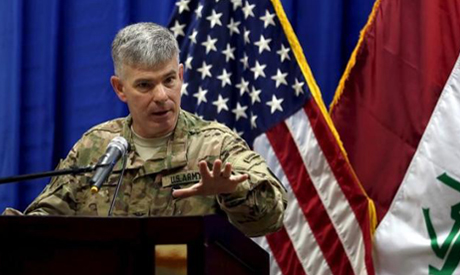
File Photo: Col. Steve Warren, spokesman for the U.S.-led coalition in Iraq, speaks to reporters during a news conference at the U.S. Embassy in Baghdad, Iraq, October 1, 2015 (Photo: Reuters)
Syria expressed outrage Monday after a suspected US-led coalition strike for the first time killed regime troops, but the coalition denied its warplanes hit an army base.
In a letter to the United Nations Security Council and Secretary General Ban Ki-moon, Syria's foreign ministry condemned what it called a "flagrant aggression" that killed at least three soldiers late on Sunday.
But a spokesman for the US-led coalition said its only strikes in the area on Sunday were some 55 kilometres (35 miles) southeast of the Syrian army base.
"The Syrian Arab Republic strongly condemns this flagrant aggression by the US-led coalition forces, which blatantly violates the objectives of the UN charter," the foreign ministry said in the letter.
"The Syrian foreign ministry demands the UN Security Council act immediately in the face of this aggression and take appropriate measures to prevent its recurrence," the letter added.
It said three Syrian soldiers were killed and 13 wounded in strikes by four coalition planes on an army camp in the eastern province of Deir Ezzor.
A Syrian military source and the Syrian Observatory for Human Rights, a Britain-based monitor, said four soldiers had been killed and 13 injured in the strike, near the town of Ayyash.
The military source told AFP on condition of anonymity that the attack happened on Sunday night and also damaged two tanks at the military base.
He said the strikes hit several buildings used as weapons depots and an army training camp.
The Observatory said it was the first time a US-led coalition strike had killed Syrian government troops.
"Regime forces have never previously been hit by raids from the international coalition, which was targeting jihadist bases and oil tankers in Deir Ezzor," said Observatory director Rami Abdel Rahman.
Much of Deir Ezzor province is under the control of ISIS, which is regularly targeted there by the US-led coalition, but the regime remains present in small areas, including in the provincial capital.
The coalition began air strikes in Syria in September 2014, expanding a campaign against ISIS that began in neighbouring Iraq.
A spokesman for the coalition denied that it was behind the alleged strikes, saying its warplanes carried out no raids in the area on Sunday.
"We've seen those Syrian reports but we did not conduct any strikes in that part of Deir Ezzor yesterday. So we see no evidence," Colonel Steve Warren told AFP.
"We struck 55 kilometres away from the area that the Syrians say was struck. That was the only area in Deir Ezzor we struck yesterday," he added.
"There were no human beings in the area that we struck yesterday, all we struck was a wellhead."
Brett McGurk, President Barack Obama's special envoy to the coalition, also dismissed the claims on Twitter.
"Reports of coalition involvement are false," he said.
The Syrian government has regularly criticised the US-led strikes as ineffective and illegal because they are not coordinated with regime forces, and the ministry said the Deir Ezzor incident was further evidence of the coalition's failings.
"The US coalition lacks the seriousness and credibility to effectively combat terrorism," the ministry said.
Staunch regime ally Moscow began its own aerial campaign in Syria on September 30 and coordinates its air strikes with government troops.
The incident came a day after Obama pledged to destroy ISIS and hunt down its followers at home and abroad in a rare address from the Oval Office.
The speech followed a shooting rampage in California last week that saw an apparently radicalised couple kill 14 people.
Obama pledged that the United States would "hunt down terrorist plotters in any country where it is necessary."
But he said he would not be "drawn once more into a long and costly ground war in Iraq and Syria," saying that was what ISIS sought.
"They know they can't defeat us on the battlefield... but they also know that if we occupy foreign lands, they can maintain insurgencies for years, killing thousands of our troops and draining our resources, and using our presence to draw new recruits," he said.
Short link: